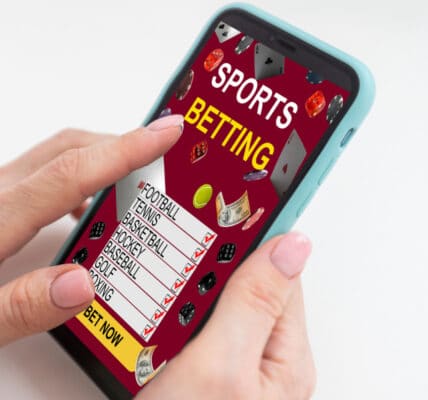A Perfect Storm of Gambling Addiction Is Headed for the U.S.

Sports betting has been on a winning streak across the United States ever since a U.S. Supreme Court decision in 2018 allowing states to decide. So far, 36 states have approved sports betting and another eight states have legislation pending to legalize sports gambling. Only six states — Alaska, California, Idaho, Utah, Minnesota, and Alabama — have no legislation pending to legalize sports betting.
With the tidal wave of sports betting has come an equally massive wave of advertising for sports betting. DraftKings has gone from spending $200 million on ads in 2019 to $1.2 billion in 2022. With DraftKings representing about 20% of the industry’s ad buy, that puts advertising for sports betting north of $5 billion a year. “The more states that legalise sports betting, the more spending goes into national TV,” says gaming industry publication iGB, noting that…
Following television, digital ad spending is the second-largest medium for gaming companies. According to Pathmatics, in January 2022, FanDuel, DraftKings, Wynn, MGM and Caesars jointly spent $25.6 million on streaming, display and social advertising.
When you combine the ubiquity of sports betting with the facility of smartphones and add a massive advertising campaign you get a perfect storm of gambling addiction that threatens to ruin countless households across the United States.
We have already written on these pages about the ways in which smartphone use stimulates the brain’s reward system by providing an endless stream of searching, discovery, satisfaction, and withdrawal. The dopamine released in the process can be intoxicating and separation from the device can be terrifying.
Gambling addiction works in a similar fashion to smartphone addiction and many other addictions. It corrupts the brain’s reward system by providing a dopamine rush whenever money is won, a sense of distress when money is lost, and an exciting sensation of anticipation as the game is played.
Combining gambling addiction with smartphone addiction and adding a massive advertising budget is going to make life very difficult for those attempting to control their gambling addiction. Numerous estimates peg the number of problem gamblers in the U.S. at two million people who exhibit, according to the Diagnostic and Statistical Manual of Mental Disorders, Fifth Edition (DSM-5):
Persistent and recurrent problematic gambling behavior leading to clinically significant impairment or distress…
It’s not pretty what gambling addiction does to a person. It’s characterized by spending embarrassing amounts of time and money gambling, often lying, hiding money and stealing money, accompanied by a persistent irritability or anxiety when not gambling.
Gambling addiction often causes sufferers to lose employment and lose important relationships. It understandably increases the likelihood of depression and the suicide rate is 15 times the average. We know it’s a problem and, like the ad budgets of sports betting companies, the problem is growing to epic proportions.
Stay Tuned for Part 2: Treating Gambling Addiction, on AddictionNews.com.
Written by Steve O’Keefe. First published February 20, 2024.
Sources:
“Gambling Disorder,” Diagnostic and Statistical Manual of Mental Disorders, Fifth Edition.
“The State(s) of Sports Betting in the U.S.,” Statistia, February 17, 2023.
“Caesars Sportsbook To Invest $1 Billion In US Sports Betting But Is It Enough?” Legal Sports Report, August 4, 2021.
“How much do sportsbooks spend on marketing and will it lead them to profit?” iGB, January 6, 2023.
“Is online gambling harming you?” Harvard Health Publishing, October 2023.
“Gambling and its dangerous, addictive side called ‘public health emergency’,” Kentucky Today, February 6, 2024.
Image Copyright: irabel8.





2 COMMENTS